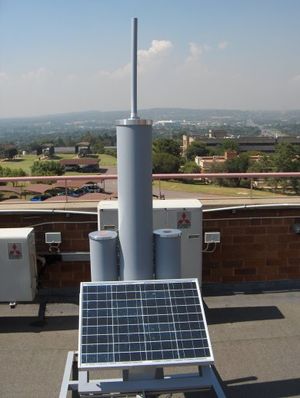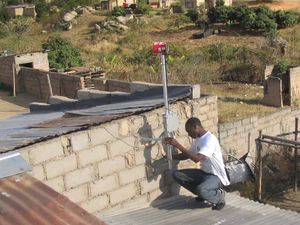Main Page: Difference between revisions
Whitespace to get it to update |
No edit summary |
||
| Line 1: | Line 1: | ||
== [[Image: | __NOTOC__ | ||
== [[Image: Tobar.jpg]] == | |||
'''The Wireless Africa group is researching ways and means to develop sustainable information and communications technology in developing countries. This will be achieved through community-owned decentralized mesh networks built on open source technology'''. | |||
== 10 December 2006 Prototype 1 of fully self-contained solar powered SA mesh node == | |||
[[Image: Sa-mesh-node2.JPG|thumb]] | |||
Their are a plethora of mesh routing protocols being used worldwide today (See: [[Wireless Mesh Networking]]). Some of these have become popular due to organizations taking the trouble to convert the specification into usable code that can be run on a wireless router while other protocols remain purely academic and have only been run on computer simulations. There is also a new 802.11s working group which is seeking to create [[Mesh Standards]]. Protocols for which code is available will be run on the massive mesh, indoor testbed, which consists of a grid of 49 nodes (See 1st thumbnail image). Some code will also be ported to run on the massive mesh - for example HSLS is being ported to FreeBSD and Linux. Performance metrics will be gathered such as average throughput and latency together with their variance. | |||
== 1 October 2005 Tin can connects rural home to outside world == | |||
[[Image: Cantenna-peebles-small.jpg|thumb]] | |||
---- | ---- | ||
[[NEW: Quick getting started guide for setting up an outdoor mesh node]] | |||
Please use the discussion tag above to comment and provide suggestions! | Please use the discussion tag above to comment and provide suggestions! | ||
Please Email wa-admin(at)meraka.org.za if you wish to contribute or for further information. | |||
[[Image: Meraka.jpg]] | |||
Revision as of 10:24, 20 February 2007
The Wireless Africa group is researching ways and means to develop sustainable information and communications technology in developing countries. This will be achieved through community-owned decentralized mesh networks built on open source technology.
10 December 2006 Prototype 1 of fully self-contained solar powered SA mesh node

Their are a plethora of mesh routing protocols being used worldwide today (See: Wireless Mesh Networking). Some of these have become popular due to organizations taking the trouble to convert the specification into usable code that can be run on a wireless router while other protocols remain purely academic and have only been run on computer simulations. There is also a new 802.11s working group which is seeking to create Mesh Standards. Protocols for which code is available will be run on the massive mesh, indoor testbed, which consists of a grid of 49 nodes (See 1st thumbnail image). Some code will also be ported to run on the massive mesh - for example HSLS is being ported to FreeBSD and Linux. Performance metrics will be gathered such as average throughput and latency together with their variance.
1 October 2005 Tin can connects rural home to outside world

NEW: Quick getting started guide for setting up an outdoor mesh node
Please use the discussion tag above to comment and provide suggestions!
Please Email wa-admin(at)meraka.org.za if you wish to contribute or for further information.

